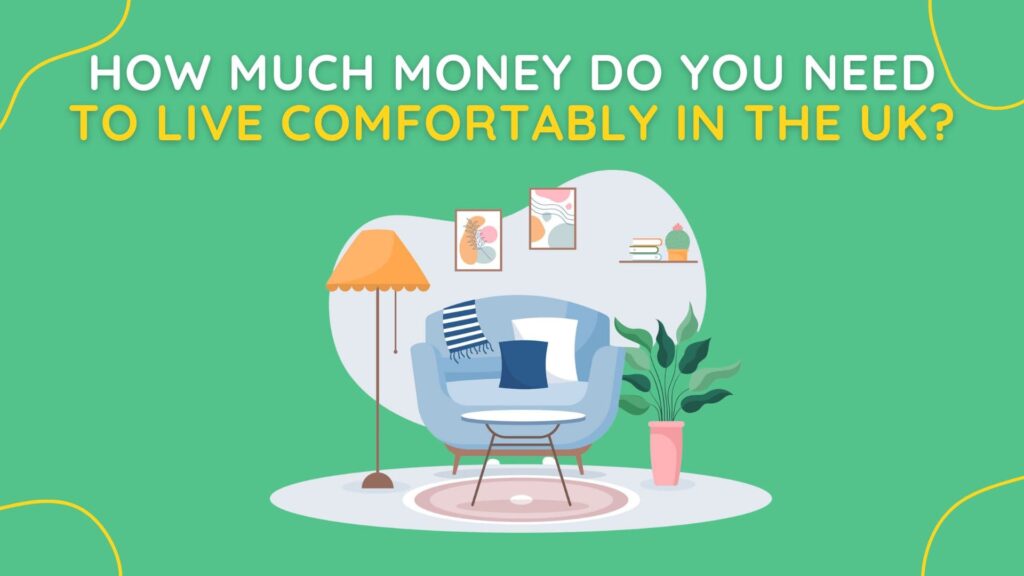
Sammie Ellard-King
I’m Sammie, a money expert and business owner passionate about helping you take control of your wallet. My mission with Up the Gains is to create a safe space to help improve your finances, cut your costs and make you feel good while doing it.
Everyone is different. Comfort for one person on a similar wage could be a struggle for another.
There are so many variables at play that could differ by the postcode you live in or the amount of kids you have.
Quality of life is also entirely subjective and difficult to place a finger on. However, it is much easier to predict living standards based on salary and the area you live in.
In this article, we’re exploring how much money do you need to live comfortably in the UK and the different scenarios at play that could effect you.
Table of Contents
How much money do you need to live comfortably UK?
To live comfortably in the UK with some financial freedom and luxuries, you need £33,600 as an individual, £49,670 as a couple and £67,554 per year for a family of four with two young children.
This is a stark contrast to just scraping by below the poverty line, which the pensions association is stating just £10,900 a year as an individual and £16,700 as a couple.
According to a study by the Josh Rowntree Foundation, a single person must earn £25,500 a year to reach a minimum acceptable standard of living, and a couple with two children needs to earn £43,400 between them.
Big difference!
Looking at recent data from the ONS there has been just 7.8% increase in wages in the 2023 so far but an average 22% rise in costs. This means that the numbers above should probably have a 15% increase to factor this in.
Let the latest technology help get you there with the best money savings apps.
The difference between comfort and scraping by comes down to things like fancier food shops, owning vehicles, holidays abroad, clothing allowance, activity budgets and Xmas presents.
To live comfortably as a family, these amounts are almost double in every department.
Again it’s essential to understand these costs are relative, and what works for one couple or family might not work for another!
You’ve nailed it if there’s enough money to cover all household bills, food shops and clothing.
Living comfortably, for me, would mean extra left over each month for saving and investing, a holiday abroad each year and enough to spoil the kids or yourself once in a while.
Things to take note of:
- Consumer Prices Index (CPI) annual inflation is 6.8% in July 2023 (this is the price for gas, electricity, housing and water)
- This is down from a peak of 26.7% in January 2023 but costs haven’t retracted they’re just higher across the board now
- Costs for energy are higher than reported but lower than the 54% we were facing earlier in 2023
- The average weekly food shop has risen by 22% in some parts of the UK
- Wages have not increased in line with the cost of living
Join over 1,000 others learning how to go from £0-5k with just 60 minutes work a day.
Includes everything you need to create, build and sell profitable digital products in a niche you're already passionate about.
How much does it cost to raise kids?
The answer here is a lot. If you’re a single parent, it can amount to £200,000 per child.
This cost is lower if you’re a couple as your childcare costs are lower, so Child Poverty Action Group works out this amount to be £160,000.
When we break this cost down per month, that’s £925 on average spent per child.
Now, if you add a second child, this amount goes down as you can buy things in bulk or batches, but it only decreases by around 15-20%, depending on the age difference between each child.

Cost of UK housing
The cost of housing varies hugely by area and even by postcode. London is the most expensive place in the UK, but its wages are higher.
Recently, we’ve seen rental prices spiral out of control as landlords raise rents in line with higher mortgages, insurance costs and management fees.
The average rental price for a one-bedroom property currently stands at around £1800.
We recommend spending 30-40% of the total salary when renting, making it completely unaffordable for those with an average or below-average wage!
If you want to live in the capital, you will likely need to buddy up so you can get more bang for your buck.
There’s even people looking for ways to live rent free and we cannot blame them! If you’re wondering how much rent can you afford then you can read all about it.
General living expenses
For general living expenses the average cost of living varies hugely by location.
Take London for example, my recently updated study on the cost of living in London shows that to live comfortably you’d need a £50,000 salary.
This is just over £3,100 net income a month.
Manchester overall is said to be 34% cheaper than London so this would make a comfortable salary at £2,046.
If you factor in joint costs a single person living in London would need around 10% less and a single person living in Manchester would need around the same.
Then if you look at the more rural areas this number can be almost half the amount you’d need in the capital.
Let the latest technology help get you there with the best money savings apps.
Average salary in the UK by area
The average yearly wage for full-time workers in London in 2022, according to Statista, was £41,866, compared with £29,521 for workers in North East England, which was the lowest in the United Kingdom in 2022.
This is gross income, so you would need to take off income tax, national insurance and any student loan debt if you have any.
- London – £41,866
- South East – £34,431
- Scotland – £33,332
- East – £32,529
- West Midlands – £31,601
- South West – £31,339
- North West – £30,716
- Wales – £30,569
- East Midlands – £30,326
- Yorkshire – £30,000
- Northern Ireland – £30,000
- North East – £29,251
Average income by sector UK:
- Financial and insurance activities: £43,821
- Electricity, gas, steam and air conditioning supply: £42,450
- Mining and quarrying: £42,386
- Information and communication: £42,267
- Professional, scientific and technical activities: £37,484
- Creative Industries – £32,443
- Hospitality – £29,000
- Consumer services £24,242
Source: Indeed, Statista and TotalJobs.
How to navigate the cost of living?
There are significant regional differences in play when it comes to the cost of living across the UK.
We all know London is the most expensive, but Manchester is catching up as it goes under significant redevelopment and people pour into the city.
To live comfortably in London, you’re expected to have at least £2200 per month after tax. This is because rent prices have risen so fast along with food costs.
Inflation is at a 40-year high, meaning everything costs more now.
This will eventually subside, and things will begin to balance out, but right now, the cost of living in London is extremely high.
If you’re looking to make your money go further, it might be worth looking into more rural areas with access to city centres.
For example, we moved to Hampshire because it has a 40-minute train to London, and we could get a bigger home for less money.
Even though travel costs have increased hugely, we’re saving money living further out because everything costs less. Overall it’s worked out to be cheaper living in the countryside.
How to manage your money?
Money management is the most important aspect of personal finance.
It doesn’t matter what your salary levels are – correct money management will allow you to live the the life you want to.

With our spending habits the biggest killer of our monthly paycheck we’re going to look at some ways you can make your money go that little bit further.
Cut back on spending
Yes, those Pret Lattes every morning and after lunch certainly add up but cutting back on the things that make you happy isn’t the place to start.
Start looking at things like subscriptions that you barely use and that gym membership you’ve been to twice this year.
Once you’ve done that, if you’re still struggling, then start by taking a morning coffee in with you or making packed lunches on a Monday and Tuesday (it’s easier at the start of the week).
Cutting back on things while times are tougher is necessary, especially if you’re looking to make your salary go further.
Our tip is to create a fund with all the money you save and look to put it towards something like a holiday or a gift for a loved one.
Save where you can
Making a savings pot for the bigger life purchases is essential if you want to live comfortably and reach some loftier goals like getting your first home.
We use the Monzo round-up feature and round each purchase up to the nearest pound. This goes into a separate pot and will quickly add up over the next few months.
We saved £560 last year, which we used towards our family Christmas gifts. Not bad for some loose change!
Let the latest technology help get you there with the best money savings apps.
How to budget correctly to live comfortably
To budget correctly you simply need to understand your income vs expenses.
Yes, we know budgeting isn’t cool, but making your money go further is essential, and that’s done via a budget.
Taking just 30 minutes a month to go over your personal or household budget will make a massive difference.
72% of Britons can’t make it to the next paycheck without spending all they have, mainly because they don’t budget correctly.
Use money savings apps or budgeting sheets that are pre-designed for you.
Even a simple list can do but make sure you keep an eye on your bank account, so you spot any increases in expenses.
 Sale!
Sale! Ultimate Financial Planner
£25.00 Original price was: £25.00.£17.00Current price is: £17.00.
Look at side hustles
Relying on one source of income is always risky. Sure your job might be stable, but if something happens outside of your control to your employer, then you could be out of work with no backup.
Starting a side hustle can help add to the pot and also allow you to make money from your passion.
Examples of side hustles that generate passive income are things like starting a blog, selling crafts, making t-shirts or freelancing on sites like Fiverr.
What about in retirement?
Living comfortably in retirement really depends on the lengths you’ve gone to set yourself financially for when you can no longer work.
Only you will know how much much money you’ll need to retire.
Having a personal pension alongside a workplace pension is a great place to start.
This will give you a cushion and allow you to drawdown over long periods of time keeping your lifestyle propped up and comfortable.
If you’re struggling you could look at selling your home and downsizing or if you want to stay put then there are other options like lifetime mortgages (equity release).
FAQs
How much money do you need to live a good life?
To live a good life in the UK a salary of £42,000 or more is required. In London this increases to £50,000.
Everyone’s situation is different as variables such as location, financial circumstance and dependants come into play.
What is a good salary for a single person UK?
A good salary for a single person in the UK would be anything above the average wage of £33,000.
Once you’re above £64,000 you move into the top 10%.
This is all relative and what person deems a good salary will be different to the next.
What is a high salary in the UK?
A high salary in the UK is anything above £64,000 which would put you in the top 10% of the country.
The top 1% earn £172,000 or more but these levels are very difficult to reach for the average individual.
Roles above the £64,000 are usually senior management and often require vast experience.
Conclusion
So, how much money do you need to live comfortably in the UK? The answer depends on your family situation, where you live, your outgoings and many other variables.
If you’re looking for an easy life, then make sure you do things like budget well, side hustling for a second income and create savings goals for a more significant purchase.
All of these things will help make life that little bit easier.
More like this
Share this article with friends
Disclaimer: Content on this page is for informational purposes and does not constitute financial advice. Always do your own research before making a financially related decision.




